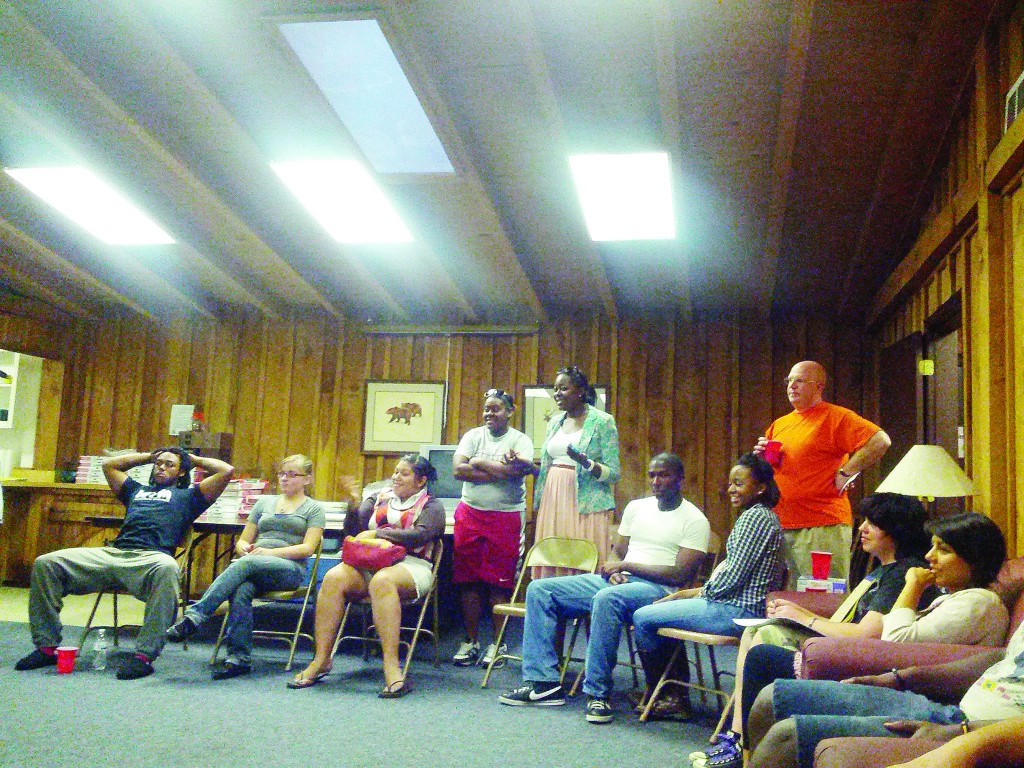Multicultural retreat: Maryville College students discuss cultural issues

During the multicultural retreat, students discussed how to
improve diversity issues on campus.
On, Sept. 21, 35 Maryville College students and Larry Ervin, director of multicultural affairs, rode to Camp Wesley Woods for the weekend Multicultural Retreat. The purpose of this event was to discuss cultural identities, resolve issues on campus and find ways to improve cultural understanding in the community and among peers.
The students in attendance were members of multicultural groups, such as Black Student Association and ALANA scholars, who are important to celebrating diversity at MC and addressing cultural issues on campus. Friday night, students circled up and introduced themselves.
Then, Andy Lewter, associate dean of students, led the discussion about the different identities present at the multicultural retreat. Lewter asked students about issues they had encountered on campus involving racism or stereotyping and how they should be addressed. Suggestions included many things, such as improved international student integration, inclusion of non-traditional students and proper representation of the cultures on campus.
The following morning, the Campus Center for Calling and Career visited the group and discussed writing resumes and how to use the CCC resources available to students. Later, Dr. Kathie Shiba, professor of psychology, and Dr. Jerilyn Swann, professor of biology, arrived to talk about how to handle situations in which one is being stereotyped. Shiba explained two categories of racism: overt racism and micro-aggression.
Overt racism occurs when someone makes a comment that is explicitly racist. Students gave examples such as people asking if they could play basketball or jump since they were black. Micro-aggression is a more subtle type of racism that happens daily, even from people who claim to be non-discriminatory. Most examples of this come from people’s assumptions of other cultures. Examples of micro-aggression could be someone acting surprised that a black person is “articulate” or that an athlete is “smart.”
Assuming that one knows everything about his or her culture is another of these subtle forms of racism. Students surprised each other with stories of such discrimination occurring on campus.
“There were some things that people talked about that they noticed on campus that people would discriminate against them,” said MC freshman Brian Reid. “Like the basketball players, because the basketball and football players that were at the multicultural retreat were really nice people, but people judge them on campus without even talking to them.”
After discussing and giving examples of these two types of racism, students then discussed how they reacted to stereotypes. Some said they felt angry or inferior, and others said they would try to educate people. Shiba suggested shifting attitudes, where one would pause, take a breath and address the stereotype by asking a question to see what the person thought he or she knew.
Later that Saturday, the boys and girls broke up into separate groups to talk to alumni Smith Jean-Philippe, Shaun Turner and Toma Battle about gender issues. After these separate discussions, the group came back together to talk with alumni Bobby “BJ” Field about what MC was like when he attended in the 90s and how far MC had come in being diverse since he was a student. That night the group gathered around a campfire to eat smores and have an open discussion about personal cultural experiences. The main topic of this discussion was discrimination problems with interracial dating; students exchanged thoughts and stories on the subject.
“I liked the cohesiveness of the group-how we all became truly friends,” said philosophy major Tina Watts. Sunday morning, the students woke early to attend College Day at St. John Baptist Church, where Voices of Praise performed two songs. After the church service, students returned to MC with much more knowledge and understanding of multicultural issues, including ones that they deal with on campus.
Participants in the retreat are prepared to now reach out to their fellow MC students, and encourage them to join multicultural groups such as Black Student Association, Global Citizenship Organization and Gay-Straight Alliance.
“I see how important it is to join a multicultural club, no matter who you are,” Reid said. Already, students who attended the retreat are making an effort to reach out to other diverse students.
“When I identify different diverse students, I just kind of make myself available to them and introduce myself,” Watts said. “Just be more open to try to draw them out, because you never know who’s never been spoken to or who’s been on the campus, might be a freshman, and just feel kind of alone.”
